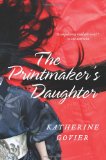Summary | Excerpt | Reviews | Beyond the Book | Readalikes | Genres & Themes | Author Bio

A Novel
by Katherine GovierPART 1
1.
Introduction to the Ghost
Hey, you! You with the big chin! Oei!"
He's calling me.
I don't answer him. Not yet.
I dip the tip of the brush in the ink bowl.
I let it sink. I lift it, turn it, and press it down into the ink again.
Then I lift and tap.
I press it against the edge of the bowl, twisting so ink beads at the tip of the bristles and then drops back into the small, still, dark pool. Again I press the hairs of the brush into the ink, flattening the bulb against the bottom of the bowl, rolling it.
"Don't press so hard!" the Old Man barks.
I bare my teeth. "Shut up, Old Man." He laughs. Thinks he's distracted me.
But my hand is zealous. To spite him I press for one full minute. I lift the brush from the bowl. It is not dripping, not full, but fully moist. I hold it over the paper, balanced in my fingers. I raise and lower it, ever so slightly, giving it breath, and then touch the point to paper. I begin the fine, fine lines of the courtesan's nape hair.
That which he has no patience to do, and no steady hand.
"Oei!"
I don't answer. I stay inside my head.
I am Oei. Katsushika Oei. Katsushika I take from the place where my father was born. Oei is a pun on how he calls me. It means "Hey, you!" I have other names: Ago-Ago - he gave me that too - meaning "Chin-Chin," calling attention to my big, stubborn jaw. Then there are the brush names: Tipsy, meaning just what you think; Flourishing Woman, self-evident. I've answered to many names. Though in this matter, as in others, I am no match for him.
He named himself for the North Star and for the thunder god; he named himself the Old Man Mad About Painting; he has named and new-named himself twenty times. To me he's just the Old Man.
Some people call the Old Man difficult. I don't agree. He is not difficult.
He is impossible.
True, I'm not easy myself. I do not comply. I mock, I dissemble, I glower. They say I was never properly trained to be a woman. The more sympathetic blame my father himself for this failure. It is a scandal. "She paints but does not sew," they say. Hah! That could be my epitaph. Perhaps it is. But you would have to find my grave to know.
And that you cannot do.
2.
Edo, 1800
I was born.
Into the red squall of dawn, the teem of city. Into the vast numbers of townsmen with only one name.
The earth was flat.
The shogun ruled.
It was a Virtuous Regime, a Benevolent Regime, and there was no unexpected event.
I screamed. And why not? After Miyo and Tatsu, I was Ei, the third daughter of a penniless artist. My father's first wife, who produced the first two daughters and also one son, was dead. My mother was the second woman to take on the job.
She looked critically at me, first of her children, fourth of his.
"She has large ears," said my father in a tone of delight. He seized me. "This one is mine!"
My mother was morose. "Large ears are lucky in men. Not in women."
"She looks like a little dog, a Pekinese," he said. "And look at this!" He chucked my peculiar outsize chin. "I will call her Ago-Ago."
Chin-Chin. Another of my flaws was thus pointed out to my mother. She became even more unhappy. I, on the other hand, became defiant and thrust my chin out farther.
"There is self-will in that face," she said. "It must be broken."
But my father laughed in amusement and delight. His laugh was like milk to me. He took me in his arms and I was his forever.
It was as if he'd never seen a baby before. He fed me rice water with the tip of his finger. He tied me in a sling and wore me under his ribs or on his back if he was working. From that day there were two of us, together. We slid through the clamorous throngs of our burgeoning city like carp in weeds. He said I was his good-luck charm. He did not break my self-will but made it.
Excerpted from The Printmaker's Daughter by Katherine Govier. Copyright © 2011 by Katherine Govier. Excerpted by permission of Harper Perennial. All rights reserved. No part of this excerpt may be reproduced or reprinted without permission in writing from the publisher.




Poetry is like fish: if it's fresh, it's good; if it's stale, it's bad; and if you're not certain, try it on the ...
Click Here to find out who said this, as well as discovering other famous literary quotes!
Your guide toexceptional books
BookBrowse seeks out and recommends the best in contemporary fiction and nonfiction—books that not only engage and entertain but also deepen our understanding of ourselves and the world around us.